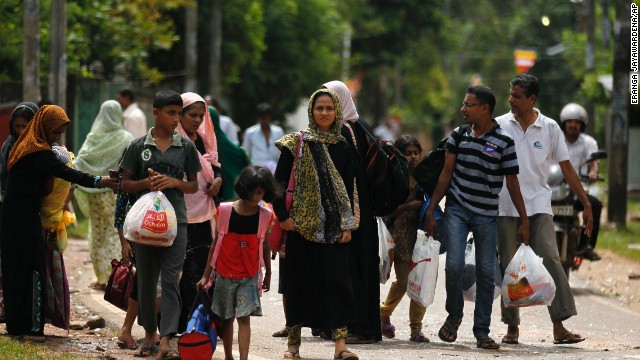
Sri Lankan Muslims seek sanctuary following a rampage by Buddhist mobs last June that many blame the Bodu Bala Sena or Buddhist Power Force, a Sri Lankan Buddhist ultranationalist movement, for inciting. (CNN)
Following the withdrawal of support on Sunday from the Muslim Congress, Sri Lanka’s largest Muslim political party, Sri Lankan President Mahinda Rajapaksa’s bid for a third term in office on Jan. 8 looks increasingly shaky. Earlier, over 20 ministers and lawmakers chose to back opposition leader Maithripala Sirisena, a former health minister under Rajapaksa. Rauf Hakeem, Muslim Congress party leader and justice minister, also recently announced his resignation from the cabinet. And on Tuesday, Sri Lanka’s largest Tamil party, the Tamil National Alliance (TNA), also endorsed the opposition, citing Rajapakse’s failure to assimilate Tamils following the defeat of separatist Tamil rebels in 2009.
Rajapaksa’s government, which has ruled Sri Lanka since 2005, has come under intense criticism for its “intolerance toward religious minorities,” according to Ameer Faaiz, an official of the Muslim Congress. According to a 2012 census, Muslims represent approximately 10 percent of the Sri Lankan population, which is primarily Buddhist. Rajapaksa’s government stands accused of backing ultranationalist Buddhist groups, allowing hardline monks to operate with impunity, and ignoring anti-Muslim violence in June which left three dead and dozens injured. The attack on Muslims in June was provoked by Bodu Bala Sena — or Buddhist Power Force, a Sri Lankan Buddhist ultranationalist movement — and took place in Aluthgama, Beruwala and Dharga Town, which are located in a popular tourist area in the southeast part of the island. The June riots followed previous attacks by Bodu Bala Sena, which went largely unpunished. Rauf Hakeem, acting justice minister during the attack, told parliament that police failed to heed the request to stem the violence, and he blamed Bodu Bala Sena for inciting the “orgy of attacks against Muslims.”
When I visited Sri Lanka for ten days in November, tensions were still high and the dislike between the majority Sinhalese and minority Muslims was apparent in most people I talked with. My tuk-tuk driver, a Muslim, would observe prayer times during our two-day road trip to Sigiriya, Polonnaruwa and Dambulla, and to get to one mosque, he parked along the main road and crept through a maze of dark alleyways. He later told me this was to avoid any protesting Sinhalese toward the front of the mosque — evidently there had been recent trouble at this particular mosque. His perception was the government was hiding the true size of the Muslim population, which he estimated between 15–20 percent, from the majority Sinhalese in an effort to tone down anti-Muslim rhetoric.
I also met a kind middle-aged woman on the train from Colombo to Galle, who was amazingly forthright in her criticism of Muslims. As I walked through the streets of Galle the next few days, just a few towns south of the July attacks, I witnessed little interaction between the Sinhalese and Muslim populations, and spoke with others who were critical of Muslims.
Sri Lanka has a history of violence breaking out during elections, and according to the Centre for Monitoring Election Violence, there have been a total of 271 incidents of election related violence since the issue of the announcement of the presidential election made on Nov. 20, 2014. Tensions are high between Sinhalese and Muslims following the June attacks by Bodu Bala Sena, and some analysts deem the combined Muslim and Tamil vote (around 23 percent) may decide the election. With the recent loss of support for Rajapaksa’s government, and their fear that the election will be close, they may be tempted to bring in the military to frighten off Tamil and Muslim voters in the north and east of the country. This action could prove catastrophic, however, as tensions could easily escalate among the few and spillover into bloodshed, something most of the minority Muslim and Tamil population fear and the majority of Sinhalese would like to avoid.